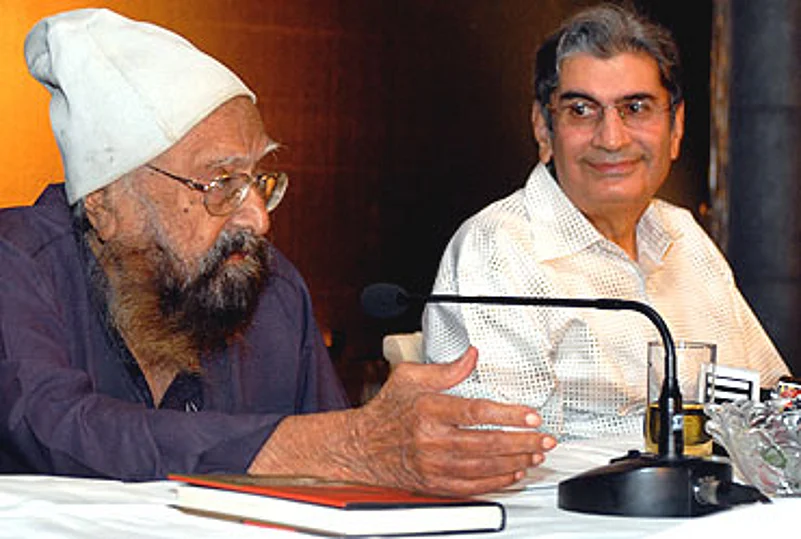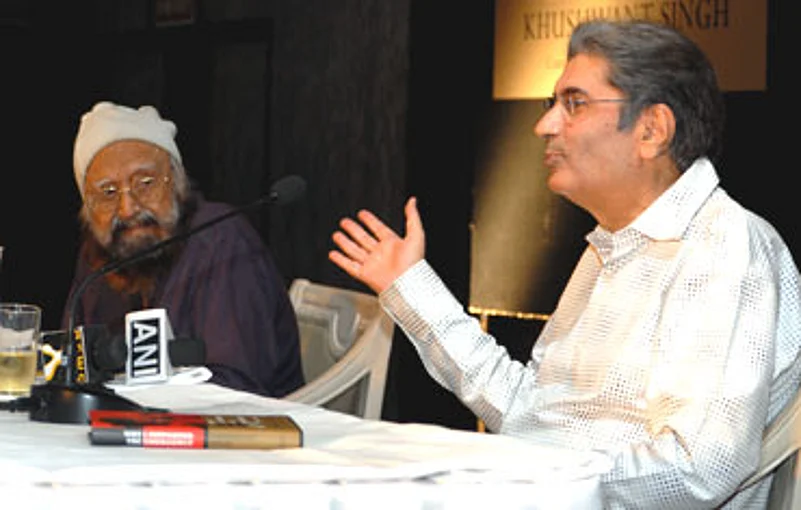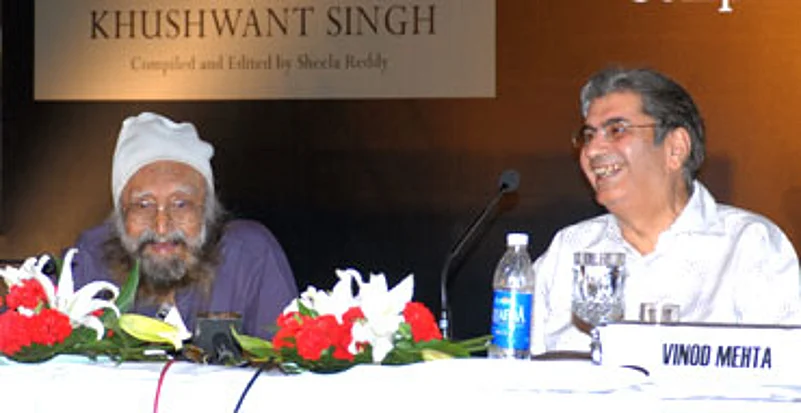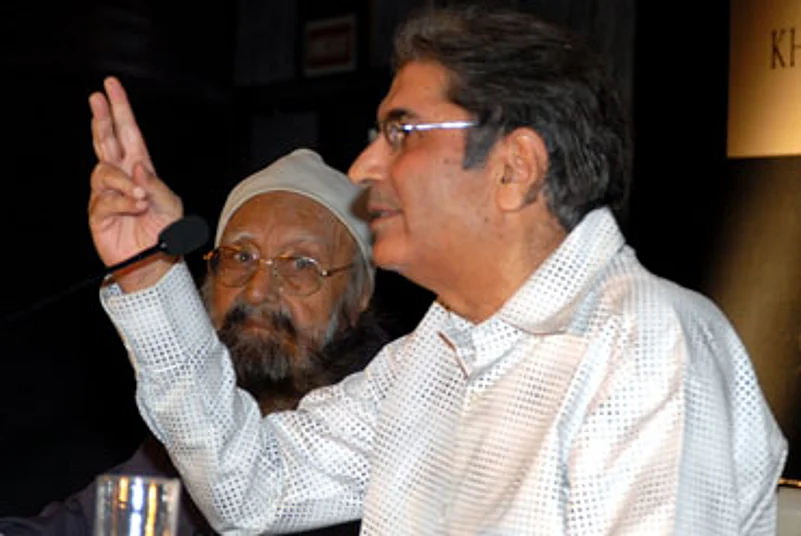When two legendary editors get together for a no-holds-barred conversationranging from sex, dirty jokes to Maneka's "badly brought up" son,Varun, there is really nothing to hide. The following are some excerpts from theconversation between Outlook's Editor-in-Chief Vinod Mehta andKhushwant Singh at the launch of Khushwant Singh's latest book, Why ISupported The Emergency: Essays and Profiles, edited and compiled by SheelaReddy:
Vinod Mehta: Debonair had a thing called 'centrefold'. I usedto consult Khushwant quite often on that matter. And so our friendship has grownsince 1974. It had a few hiccups. I wrote a book on Bombay called Bombay - APrivate View and Khushwant had a full chapter in that book. When I metKhushwant for an interview, I asked him, "What did you do in England whenyou were there for so many years? He replied: "Fucking, cheese andwine..." I have known him since then and it's been a pleasure.
Advertisement
Khushwant, I do not want to talk about the Emergency because that is so faraway. But you write a lot about famous people who are dead. One of the chargesmade against you is that since dead people can't sue, you are rather unkind tothem. Have you ever had any rule on writing about dead people? You want to benice to them or you want to kick the boot in? I remember you wrote somethingabout Rajni Patel...
Khushwant Singh (leaning forward to catch what Vinod is saying): Areyou asking me why I write so much?
Vinod (speaking more loudly): No, No. I am asking you, do you have anyrule when you write obituaries. One of the charges against you is that youare very unkind to famous people who are dead.
Advertisement

Khushwant: I have a different attitude to writing obituaries. Mostpeople think that when a person dies, he somehow becomes a saint. And that youmust only have nice things written about them. That's not my point of view. Whenyou write an honest obituary about a person, if you think that person is arascal, say so. In writing so, if relations get hurt, so be it. It does notmatter. That's been my way of writing. I know when I go lots of people will havenasty things to say about me. I won't be there to read them but I hope my familywill be able to take those things in their stride.
Vinod: In your 94 years of a very eventful existence, who is the mostobnoxious person you ever met? Is it a long list?
Khushwant (laughing): In my long life, there are about three or fourpeople I have really detested from the bottom of my heart. I think Krishna Menonis on top of my list because I served under him for four years. I knew what kindof person he was. There are others I won't like to mention. He is gone, so hecannot do anything to me. He cannot sue. That's the safety about an obituary.They cannot sue. Neither can their offspring for something you say about theirancestors. So it's pretty safe. There are about three or four others, but Ithink I will spare them.
Advertisement
Vinod : You cost me a friendship. When I was editor of SundayObserver, you wrote something about your great friend Rajni Patel?
Khushwant: Rajni Patel was my friend from college days in England. Ihad known him. The man was the most unprincipled politician that I ran into. He ruled Maharashtra for some time ruthlessly. I have not the slightest doubtthat he was also extremely corrupt. He made a lot of money. When I wrote hisobituary, I did it with affection but I did not spare him.
Vinod: Malcolm Muggeridge once said that the British have sex on theirbrains and that's the wrong place to have it...
Advertisement
Khushwant: That's quite right.
Vinod: Do you think Indians also have sex on their brains? Do Indiantalk more about sex than actually do it? Are we great talkers about sex? Do wetalk more about sex and perform less?
Khushwant: Indians have it on their brains more than they have in theright place but as it happens, when you age, it automatically shifts from themiddle to the head, and you are obsessed with it. It never leaves. It issomething which is elemental, vital and far more important than other emotionslike love or anger. This is elemental and it expresses itself in weird forms.You cannot suppress it, that's why things like celibacy do not work. Desire tohave multiple relationships is also human. I wrote about the so-called happilymarried couple many times. Whether they do it or not, adultery is always at theback of the mind of both.
Advertisement
Vinod: You have written quite explicitly about sex in several of yourbooks?

Khushwant: Yeah, I have a dirty mind. I have a vast collection ofdirty jokes which are really funnier than ordinary Sardarji jokes or Parsi jokesor Gujju jokes. But unfortunately in this society, if I publish it, I will bebehind bars for obscenity. But I have a collection which I hope will beposthumously published.
Vinod : As a literary kind of person, VS Naipaul once told methat he found writing about explicit sex very difficult because he was worriedthat his mother might read the book and will not talk to him ever again. Iswriting about explicit sex very difficult, in literary terms?
Advertisement
Khushwant: I do not think it is done deliberately but it is sointegral and important to one's life that you cannot really avoid writing aboutit. Human relationships are basically dictated by desire for sex.
Vinod: Is actual writing about explicit sex very difficult? People dosay that sex is such an absurd act, what two people do to each other.
Khushwant: One reads so much about what people do to each other (inthe name of sex) -- the law cases, in daily papers, from friends and theirproblems. I have realised how multiple the relationships between man and womancan be and what weird forms it takes sometimes. Some of them are quiteunmentionable. So I feel you are being quite dishonest if you do not write aboutit.
Advertisement
Vinod: But is it difficult writing about it, describing things? Youhave written a lot about it. Do you find writing sex scenes easy or difficult?
Khushwant: There is not all that much sex in my writings. I haveearned the name of dirty old man but apart from one or two incidences in myshort stories or novels, most of what I have written about is very serious stuff-- history, biography, religion. Not being religious, I have written more onreligion than any other Sikh alive today.
Vinod : Now a critical question, a million dollar question: Howdo you lure so many beautiful women? You are the most envied man in India.
Advertisement
Khushwant: I really have no idea but it is a fact that I have a lot ofvery attractive young ladies dropping in on me periodically and I thoroughlyenjoy their company. But let me also add that as I get old, I also get verybored with them very soon and like (I do with) others, I send them packing atexactly quarter to eight. I do not mince my words. I tell them, ‘now yougo’. I have had enough.
Vinod: Let's talk about journalism. What do you think of editors oftoday and how do they compare to the legends of your time?
Advertisement
Khushwant: In my time, the editor was the boss of every paper,particularly the magazines. Now there are national papers with all Indiacirculations like Times of India, Hindustan Times, but I do noteven know the name of the editor because he no longer runs the paper. It iseither the owner or the proprietor. They take as much news as you can get in theheadlines, in the front page, the rest is all Bollywood or dress designers andpretty girls. You look at all the papers, they are pretty unreadable. I read youbecause I find you readable. But I do not recall the names of other editors whoI bother to read. (Ramachandra) Guha perhaps, but he is not an editor. There area few journalists for whom I always stop and read because what they say iswell-written and is plausible.
Advertisement
Vinod: But do you think editors of your time were a little pompouslike Girilal Jain saying that I have written my editorial for two people inIndia -- the Prime Minister and myself?
Khushwant: No, it was (Dilip) Padgaonkar who said that he was thesecond-most important man in India after the prime minister. He was editing the Timesof India at that time. In my time, S.M. Mulgoakar was a good writer. FrankMoraes was a good writer. But they are all in the past tense, I can think of noone in present times. I go through about six to eight newspapers everyday andmost of my time is spent doing crossword puzzles because that's the onlyinteresting thing I find in newspapers today.
Advertisement
Vinod: One great editor of Times of India, Mr N.J. Nanporiaused to buy things from Sunday chor bazaar. One day, in one shop a chapcame and said, "Good afternoon, Mr Nanporia." He kept following him.He kept wishing him "good afternoon" wherever Nanporia went. At theend, when Nanporia was getting into his car, he said, "You are a very nicechap but who are you? The man replied: "Sir, I am your chief reporter..."Do you think I am justified in calling my dog, Editor

Khushwant: Yes.
Vinod : Graham Greene once said that a man should not be judgedby his friends alone. He should actually be judged by the enemies he has. So whoare your great enemies?
Advertisement
Khushwant: I have no enemy. Unless it is religious fundamentalists. Iwas worried when we had Bhindranwale and I had the nerve to write against him. Iwas under police protection. That's why I keep my fingers crossed.
Vinod: Can I ask you something about Mr L.K. Advani?
Khushwant: I was really disappointed with Mr Advani. I knew him and Isigned his nomination papers when he fought the elections in Delhi because hewas an able man. He spoke well and he was a clean man. I nominated his name andthat was well calculated by his supporters because at that time, soon after1984, the Sikhs were not willing to vote for the Congress. They did not know whoto vote for. When they published his papers with me signing them, the Sikhsvoted in his favour and he won quite easily. And he came to thank me. But whenhe started this rath yatra, I was really disappointed and I said so in apublic meeting at India International Centre. He was then the Home Minister, hecame with his Black Commandos and I was presiding because I was then withPenguin. I took the liberty of saying: "Mr Advani, I am here. I am not wellbut I am here and I want to say things to you which I may not say otherwise...You sowed the seeds of communal hatred in this country and the country will payfor it... I always believed that you are clean, honest and you do not womanise.Such men are dangerous."
Advertisement
Vinod: You were called Indira Gandhi's chamcha?
Khushwant: I supported her when I thought she was right in imposingthe Emergency. With some reservations, I supported the Emergency proclaimed byIndira Gandhi on June 25, 1975. Let me explain why. I concede that the right toprotest is integral to democracy. You can have public meetings to criticise orcondemn government actions. You can take out processions, call for strikes andclosure of businesses. But there must not be any coercion or violence. If thereis any, it is the duty of the government to suppress it by force, if necessary.
But when she curbed the freedom of press during the Emergency, I withdrew mysupport. Indira Gandhi had the habit of snubbing whoever opposed her. She waswaiting for a chance to snub me. I never gave her the chance as I never met herafter that.
Advertisement
Vinod: Any regrets about being a great fan of Sanjay Gandhi?
Khushwant: He may have been impatient but he was right. We doneed compulsory population control in this country. But how we go about it, Idon’t know. I did support him and I have no regrets about it.
Vinod: But you also called him a bit of a goonda. Amongcontemporary Indians who are not dead, who is the one man that you admire themost?
Khushwant: The man I admire the most is Manmohan Singh. The man hasideals. I recall when he fought the elections in South Delhi against Vijay KumarMalhotra. Three days before the polling, his son-in-law came to see me and saidthat we do not have the money to take voters to the poll. We need to hirehundreds of taxis and buses to take them there. I said: How much do you think itwill be? He said, at least a couple of lakhs. So the next day I gave it to himin cash. After the election results, when Manmohan Singh had lost, he rang me upand asked me if I was alone and could he drop in. I said yes. He came carrying abundle. He said, 'I believe you lent my son-in-law this money for my election totake voters to the poll, I have not spent it.’ And he gave it back to me. Canyou think of another Indian politician today to do that kind of thing? Myrespect for the man went up.
Advertisement

Vinod: Just two more questions: What's the best joke you have heard?You have written so many of them.
Khushwant: All my best jokes are filthy jokes and I do not think it isfair to tell them (in public). But on another occasion, in my own home, Ipromise you a very jovial evening, full of dirty jokes.
Vinod : What would you say to Maneka and Varun Gandhi, if you metthem today?
Khushwant: She has a badly brought up child. I could not believethe words that are being attributed to him. Of course, he first denied it butcould not get out of it because it was recorded. You do not say abusive wordsfor the Muslims and Sikhs in public because it's an ethnic insult. All hismother's relations are Sikhs. What he said about Muslims is totallyunpardonable. I think he should be banned from fighting the elections but I amno one to say that. I hope that the electorate puts him out. But I suspect hewill win that constituency.
Advertisement
Vinod : Now I must do your job and tell you a joke. WinstonChurchill was a guest of President Roosevelt in the White House during the war.One day he called his PA to his bathroom to take dictation. When the PA wentinto the bathroom with his pad, he found Churchill stark naked with a cigar inhis mouth and he kept dictating. Suddenly, there was knock on the door andChurchill went and opened the door and there was Roosevelt staring him in hisface. Standing in his birthday suit, with quiet aplomb, he said: 'Mr President,you see, I have nothing to hide.' Long live Khushwant Singh.




















